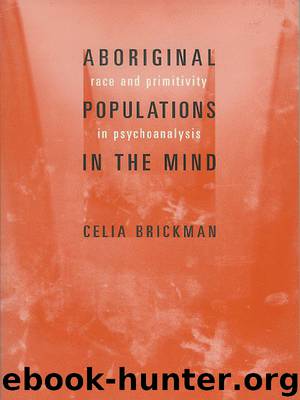Aboriginal Populations in the Mind by Celia Brickman

Author:Celia Brickman
Language: eng
Format: epub
Tags: PSY015000, Psychology/History, PSY026000, Psychology/Movements/Psychoanalysis
Publisher: Columbia University Press
Published: 2003-08-14T16:00:00+00:00
POSTCOLONIAL SCHOLARS have increasingly begun to revisit the anthropological and historical archives, to demonstrate how the colonizing impulse of the west helped shape the categories of anthropological and historical knowledge concerning the colonized, to create a space in which those histories can be reimagined and rewritten, to recover the voices of the colonized, and in these and other ways to contribute to the reshaping of social policy (as in the case of various aboriginal peoples whose continued oppression remains very much tied to the colonizing categories with which they have been anthropologized). They aim to disrupt the monopoly of the European gaze on the history and life-worlds of its colonized others, and to imagine postcolonial encounters that refuse the tropes that have sustained this monopoly. The postcolonial project extends beyond the bounds of anthropology, rejecting as it does the divide between the disciplines of anthropology and history, which is itself a symptom of the very set of problems postcolonial theory seeks to address; and it is written from the confluence of a number of contemporary critical perspectives, particularly Marxism and poststructuralism, whose applications span both the humanities and the social sciences.28 The move from anthropology to postcolonial studies has been a move from a western discourse speaking about the non-west to the interrogation of this discourse from non-western perspectives in order to excavate the distortions built into its terms, and to represent non-western histories and politics from previously excluded vantage points. Postcolonial scholars, together with critical race theorists, lay bare the construction of modernity and of modern western civilization not only as a development internal to the west but as one whose achievements have been built on materials, labor, and profits wrung from Europe’s various colonizing enterprises, from the Atlantic slave trade to the mines and rubber plantations of Africa and South America.29 Gayatri Spivak and others have contended that the previously colonized peoples of the Third World (and the still colonized peoples of the fourth world) have contributed not only to the material wealth of the west but also to its “possibility of cultural self-representation,” through their crucial role as the raw material out of which universal theories of culture, society, and the mind have been constructed.30 Edward Said further argues that reckoning with the previously disavowed role of colonialism in the construction of modernity was the crucial (if seldom acknowledged) issue in making evident the failure of grand narratives which is said to have ushered in our era of postmodernity.31
But questions of representation and its authorization remain. Not only anthropology but the canons of western history and political philosophy too, have represented non-western and non-white populations as politically immature, as pre-political, as not yet ready to assume independently the political institutions developed to safeguard liberty and equality in the west.32 Historicization, the remedy for the temporal othering of the non-west as timeless, turns out to reproduce the unilinear time line of evolutionary thought, conceptualizing the non-west as historically, if no longer biologically, less developed and therefore consigned to
Download
This site does not store any files on its server. We only index and link to content provided by other sites. Please contact the content providers to delete copyright contents if any and email us, we'll remove relevant links or contents immediately.
| General | Discrimination & Racism |
Nudge - Improving Decisions about Health, Wealth, and Happiness by Thaler Sunstein(7689)
The Fire Next Time by James Baldwin(5421)
iGen by Jean M. Twenge(5403)
Adulting by Kelly Williams Brown(4561)
The Sports Rules Book by Human Kinetics(4377)
The Hacking of the American Mind by Robert H. Lustig(4363)
The Ethical Slut by Janet W. Hardy(4236)
Captivate by Vanessa Van Edwards(3835)
Mummy Knew by Lisa James(3680)
In a Sunburned Country by Bill Bryson(3528)
The Worm at the Core by Sheldon Solomon(3483)
Ants Among Elephants by Sujatha Gidla(3458)
The 48 laws of power by Robert Greene & Joost Elffers(3219)
Suicide: A Study in Sociology by Emile Durkheim(3009)
The Slow Fix: Solve Problems, Work Smarter, and Live Better In a World Addicted to Speed by Carl Honore(3001)
The Tipping Point by Malcolm Gladwell(2903)
Humans of New York by Brandon Stanton(2864)
Handbook of Forensic Sociology and Psychology by Stephen J. Morewitz & Mark L. Goldstein(2691)
The Happy Hooker by Xaviera Hollander(2682)
